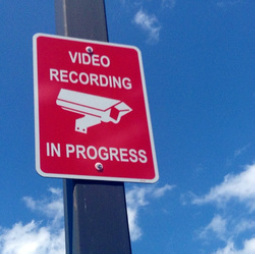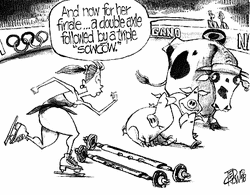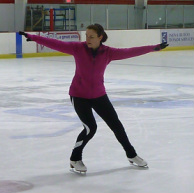 I'm sure everyone has been wondering, "How is Christie's skating coming along?" I mean, it's been 2+ years of lessons now (one 30-minute lesson per week--summers off--and three 90 minute skating sessions per week--again, summers off). So it's time for a check-in to see all the amazing progress. I have been applying principles of sport psychology, using my mental tools to help me learn and develop skills, mentally rehearse and perform with confidence. One tool I had purposely neglected to use--and I had my own good reasons--was videotaping my practices. While videotaping practices and performances has a number of very positive uses for athletes, for me, the idea of possibly seeing that the reality didn't match the beautiful fantasy in my mind, was a slope as slippery as the ice I magically sail upon. Content to use observation of other skaters and my coach as my examples of proper execution, my visualization practice involved seeing myself and my skating from a first-person point of view. I would see the ice, the rink, my skates, from an internal perspective, not third-person the way I actually appear to others. In my images, I perform the skills just as I've seen others perform them. This has been effective in learning the basics, improving my confidence on the ice, and helping the movements to flow a little better. Eager to share my incredible accomplishments, I invited my husband and kids to the rink so they could be blown away by my progress. My husband brought out the video camera, and for once I was OK with it. When I finally watched the video, however, I realized the person on it was not exactly me, or the me I'd imagined in my head. There was definitely vast improvement but I could pick out a lot of things I was not doing well, to put it kindly. The confidence I felt on the inside when on the ice did not show on the video. At first I was devastated by the disconnect and wanted to just throw in the towel. After all, this is just a hobby. But the competitive side of me--and the sport psychologist--searched for the silver lining. I have reached a point in my training where I can stay stagnant or make a great leap forward. It's up to me. I can now integrate video into my active toolkit and make it work for me at a level it could not have when I was a mere beginner. The key for me is to watch with ego firmly detached, and observe from a perspective of learning, tweaking, perfecting. Rather than blissfully practice skills "slightly wrong," when I'm on the ice, I will focus on the aspects of each move and how to perform them perfectly. Practice makes perfect? Only if it is perfect practice. It will require taking a few steps back in order to bound ahead. I actually look forward to getting back out there and practicing with renewed focus. I look forward to my next video, too. Never thought I'd say that.
1 Comment
 This week I wrote an article for coaches on this site about feedback. It addresses the basics, how to give feedback, how much to give, when to give it, how often. As I was writing I reflected upon my own experience with my figure skating coach, Pavel. I know I've written about him before, and his role in my saga from scared-to-death-of-ice to pretty decent skater with a dream or two. He is old school Eastern European, meaning compliments and encouraging words are few and far between. At times it is frustrating, because I wonder why I am paying him when he doesn't say too much. But actually, I know now I am paying him for one big reason--he's good. Really good. Whether he realizes it or not, his style of providing feedback is right in line with the research which says "less is more." He has an allowable "bandwidth" of movements within which I can perform. If I stray, he is on me immediately to correct what I have done. As I have improved, the bandwidth has narrowed. He allows fewer deviations from proper form than he did when I started. For example, when I was just starting, the focus was on balance and gliding. It didn't matter quite as much at that time whether my knees were bent as much as they should have been, only that they were not perfectly straight. My arms could be out to the side, not necessarily at the perfect angle, but mainly to help me learn how they could help me maintain balance and direction. Now, however, I have noticed that if my knees are not bent enough, I am corrected quickly. He has given me more specific detail about where my arms should be, which way I should be looking, keeping my shoulders square to the short wall. With each new skill, the bandwidth for that movement is widened at first, then narrowed appropriately. I complained to him once that he wasn't giving me enough detail about how to perform a movement, what I should be feeling, which muscles to tighten or relax. I am a "thinking person" and like to have as much detail as possible. He is opposed to thinking while skating, but will indulge me if I ask. That is the key. He is holding out, waiting for me to internalize the movement, to get the feel of it myself, to experiment, adjust, and finally learn how to do it all on my own. He notices the adjustments I am making. If he doesn't see any improvement, he will offer suggestions. But mostly, he waits until I ask, which is usually when I haven't been able to figure it out by myself. The learning taking place internally for me, is vital to my success in skating. So the other day at my lesson I mentioned to him how good he is, how his style matches what research suggests brings the most success. He smiled sheepishly and said, "I know this already." Well, he certainly knows it is reflected in his pairs skating team, who recently qualified for Sochi to compete for Estonia! His lessons with me, I'm sure, bring him back down to Earth and check any ego fluctuations. How many of us "know this already" about how to get the most out of our performance? When I talk with people about what I do as a sport psychology consultant, I get a lot of comments such as, "Right! That makes so much sense!" It should. It is, as my mentor from Penn State, Dr. David Collins, used to say, "Common sense not commonly applied." I help people discover what they already have at their disposal, their brilliant and strong minds, and offer ways they can apply mental skills to improve physical performance. We are constantly adjusting to one another, Pavel and I. He gives me a few more "very goods" to keep me happy, and I ask more pointed questions when I need them but not all the time. I am learning, internalizing, and that is the point. Pavel offers a successful learning environment. I apply the mental skills I have learned over the years, and it really helps me improve day to day. Oh, and I have fun, too. Have you read the Sports section of your newspaper lately? I have. I do every day. I am always amazed by how much of what I read refers to mental aspects of a player's or team's performance.
Try it sometime. Read an article in that section and see if you can spot it. An athlete, a coach, the writer, inevitably someone mentions something about what is going on beyond the physical aspects of the sport performance. That's because the mind plays such a powerful role in ultimate behavior. The possibilities of success for an athlete who learns these techniques, and how and when to apply them, are endless. While you may not have heard specifically of "sport psychology" before, you have most certainly experienced it whether you knew it or not. That is why this is so exciting for me, and why I love what I do. I get to point out, put a name to, common sense that is not commonly applied. My clients inevitably experience that "a-ha moment" and there is a noticeable improvement in every aspect of their performance. Consider your own performance, be it in sport, business, or elsewhere. When you were successful, how did you feel? How did you prepare for a meeting, a presentation, a game? What went through your mind? When you made an error or even failed entirely, what thoughts appeared? Did you have a good talk with yourself? Replay what happened? Tell yourself you won't do it that way again? You were using mental techniques to affect physical behavior. Whoa! Breakthrough! We all are capable of great success and improvements in state of mind and behavior. The key is knowing which techniques are most effective, learning how to use them, and when to apply them. Back to the newspaper articles. Golf is in the headlines here in DC, as the AT&T National is in full swing (pun intended). Considering the actual physical effort in golf--swing, hit--takes mere seconds of the player's time, there is an awful lot of time out there when the player is left to think. In today's Washington Post, writer Barry Svrluga writes,"The walk from the ninth green to the 10th tee at Congressional Country Club cuts across the pristine practice green...There is, in those few hundred paces, a chance to think, be that productive or destructive." (emphasis added) Young golfer Jordan Spieth, just 19, felt he just needed "one break" to rebound from less stellar play. His outward appearance along the course reflected his inner voice. His shoulders slumping, eyes unfocused, he looked like a beaten man. "Maybe lost a couple of shots with my emotions there, which is upsetting," he says. He let some shots affect his thinking about future shots, a big liability in this or any game. On to London, where Wimbledon finished its opening week. Here we find more than just physical play at work for Serena Williams, number one seed. What could she have to think about when she is already so successful? Remember a rule of thumb in competition is to take each moment, each play, set, match, win for itself. Learn from it and move on. So for continued success, the mental training cannot end. "I feel like I try to play better as each match goes on," Williams said. "I try to find out something I can improve on from each match." From calming nerves to self-talk to refocusing to self-evaluation, ultimate performance depends not only on physical skill and strength, but on command and application of mental tools as well. The importance cannot be overstated. Still unsure? Open the Sports section, and read all about it.  Did you catch Washington Redskins quarterback Robert Griffin III's press conference yesterday? If so, you may have noticed he alluded several times to mental aspects of his rehabilitation. He talked about "mental reps," mindset, goals and imagery. He sure seems to have a good head on his shoulders, and knows how important it is to engage his mind as he heals his knee. RGIII said that at yesterday's practice he and a few other injured players went through "mental reps," rather than taking actual snaps and running full-speed plays. He said doing the mental reps kept him engaged in the practice, rather than just sitting there, watching. "Practice can get a little boring when you aren't taking those mental reps, but as long as you get at least a little bit of work in, we don't feel like we're completely separated from the team." This involvement is vital when you find yourself on injured reserve. In addition to helping you to still feel a part of the team, the activity that you do engage in, even mentally, continues to strengthen the neural pathways involved in the physical movement of play. RGIII held the ball, dropped back, surveyed the field and threw the ball. He did not do any sprinting or cutting like he might have if he were in perfect health. Since there was no pressure to actually complete the pass or avoid a blindside hit, he was able to focus more on the process of decision making in the plays. He explains, "The mental rep is...basically just paying attention...It helps you by looking at it from a different perspective, so that when you get out there on the field you understand that you only need to look at this guy on this play, this guy on this play, and you go about it that way." RGIII also knows the importance of setting goals when embarking on the seemingly endless road back to full activity. He said as soon as the surgery was over, he thought about the date of the first game of next season. He made that his goal for returning to play. He even set that date as his pass code on his phone! Finally, he talked about his mindset as a player. While many may criticize some of the play calling decisions made in the past, we all need to remember we are dealing with a "high-caliber athlete," as RGIII referred to himself. More may be expected, but more will likely be achieved as well. He said he wasn't going to change his mindset, his will to win, but he would do a better job of making more appropriate decisions for the situation. He also talked about his emotional mindset upon his return to play. Many athletes have a nagging doubt that their injury is truly healed, or they fear that they will suffer another injury. RGIII said, "It's all about having that confidence. If you put the work in, you'll have that confidence when you get back out there on the field. It's about playing like you were never hurt." He said when he returns to play he will not play afraid. He will believe that he is invincible. His fans are way ahead of him on that one. I am no longer a beginner figure skater. This is my favorite thing to say since about three weeks ago when my coach "tested" me on my basic skills and declared I had received a passing grade. It's a really big deal for me because I am new to figure skating itself, not just to lessons. And because up until a little over a year ago, I was deathly afraid of the ice and everything about it. Cold, hard, slippery, unforgiving--what's to like? But when my young son declared he wanted to be a hockey player and take lessons, I pulled out the mom martyr card and decided to make the big sacrifice. I would learn to skate too, so I could help him achieve his Alexander Ovechkin board-crashing celebration dreams.
I tried on my own at first, and thought I was making great strides. I was falling much less frequently--bonus! I befriended a woman who was much more advanced than I, and who kindly took me under her wing. She very directly declared I was not doing very well, and should take lessons from a coach like she was doing. I appreciated the honesty and got a coach. He and his coaching partner have been skater and coach, respectively, at the Olympic level. Naturally, I was a bit intimidated at my first lesson! Fast forward to today, and now my coach (I switched coaches to the partner back in September) actually says I'm doing "very well" once in a while. (He is not one to give positive feedback unless it is earned. I guess you could say he is the Simon Cowell of the rink. I do appreciate that, actually!) How I got from Day 1 to today was a study itself in sport psychology, and an inspiration for me to go "official" so I could help others achieve the same success. My main tool of choice was, and continues to be, mental practice. After learning the physical requirements of a movement at the rink, and practicing it (usually badly, with less than stellar results at first), I go home and relax and practice it all in my head. I try to experience as many senses as I can, recalling the feel of my muscles during the move, the placement of my skates and my arms. Even just imagining these, I can sense my muscles actually tensing, receiving the message my brain is "sending," but without the order to actually move. In my mind, I am always successful with the movement. Over and over, getting it perfect each time. By the time I get back to the rink, my mind feels a sense of confidence, that I have already mastered the new moves (albeit in my mind). My body responds as if it had all been in "real life." While not perfect, there can be huge improvement even the next day. And I don't have the fear and trepidation I had upon first learning the skill. I have set goals for myself, continue to use mental practice, and have such a blast at the rink! Look out Disney Princesses on Ice, here I come! |
"Even if you are on the right track, you will get run over if you just sit there." Personal Best SportsThe sports world is filled with stories of perseverance, failure and success, personal struggles and public triumph. Each story provides insight into the mental side of sport and activity. Archives
March 2016
Categories
All
|

